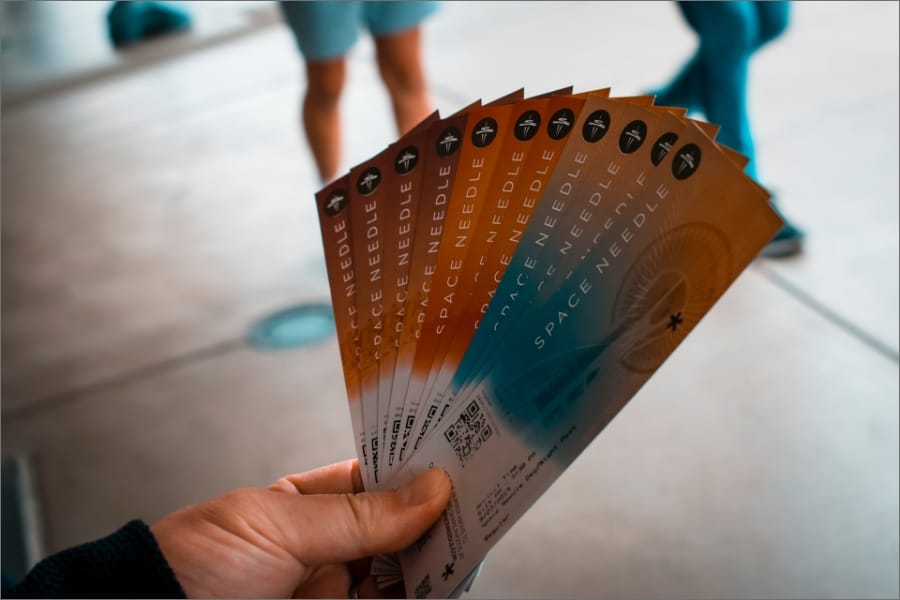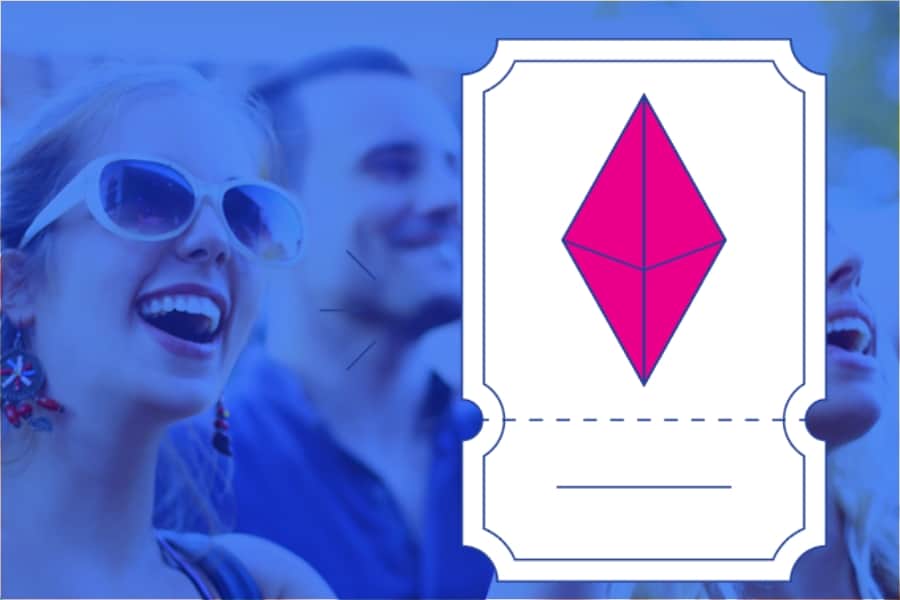Due to their specific nature, NFTs have rapidly gained attention and traction. The blockchain-based digital assets solve many of our current problems in several industries. And event management makes no difference here. However, although they have been used for numerous events, there is a legit question: are NFTs usable in large events? During this article we are going to answer this question, arguing why we could and should use NFTs in events. Be they large or small.
While blockchain technologies in general and NFTs, in particular, serve a wide range of industries, entertainment is one particular area where these technologies will completely change how stakeholders interact. It’s going to change it fast, making the industry safer, equitable, more engaging & entertaining, and ensuring a more equitable financial distribution amongst creators. And most importantly, NFTs will help you serve your attendees better.
Let’s see how!
How NFTs are helping event organizers
As an event organizer, delivering an enjoyable experience to your community is the top priority. However, regardless of the amount of work you put in, some things are just out of your control. But fear not: some of these issues can be easily solved through NFTs.
One of the biggest concerns, especially when it comes to large events, is related to event tickets. Unlike other goods, tickets to an event, no matter how big the event is, are limited. No matter how much we would like to, there is a limit that cannot be exceeded. And this makes event tickets extremely highly desired. The bigger the demand, the bigger the problems.
French minister says 70% of Champions League final tickets were fake
https://uk.news.yahoo.com/
There are two issues that currently used technologies cannot solve. Ticket fraud and secondary market sales. Although related, let’s approach them one at a time.
Tackling ticket fraud with NFT tickets
Like in the above example, for highly coveted events, fraudsters will create and sell fake tickets. No matter the security measures you take, somebody will find a way to replicate and sell them. This can lead to unpleasant situations where a large number of attendees, that paid to join an experience, are forbidden from entering the event premises. With large events, this can easily turn into public safety concerns.
Another used method is selling the same legit ticket multiple times. There have been cases when hundreds of guiltless attendees arrived at the gates holding the same, valid, ticket. Unpleasant to say the least.
Through their immutable nature, NFTs tickets will protect your community against fraudsters. These digital assets cannot be copied or altered, and the blockchain network on which they are issued and deployed is guaranteeing each new item. So it’s going to be impossible to release batches of fake tickets and try to scam your community.
At the same time, as these NFTs are minted into a digital wallet, the same NFT ticket cannot have multiple owners at the same time. Unless you decide otherwise. Nobody will be able to sell the same legit ticket to multiple buyers at once.
Transforming the secondary market

Unlike the first example, secondary market transactions are in a gray area. While some of these transactions are 100% legit, some are immoral or illegal. While it’s only normal for someone that can’t make it to an event to sell the ticket to someone else, things dramatically change when we talk about scalpers automatically buying thousands of tickets just to resell them for a profit.
But NFT tickets are giving you full control not over the initial sale, but over transactions taking place on the secondary market as well. As NFTs are connected to crypto wallets, you can limit the number of tickets that can be minted to a specific wallet address. Thus preventing scalpers to buy large quantities of tickets from your initial releases.
And as NFTs are governed by smart contracts, this means that they can be programmed to act in specific ways when certain criteria are met. You can set upper and lower prices for secondary market sales or even block them from reselling. Although eliminating the reselling option is not recommended for large events, setting up reselling limits will protect your community against those looking to make an easy profit from your work. But as we will see in the next chapters, secondary market resale can open a new revenue stream for event organizers.
New revenue streams for event organizers
But setting up lower and upper limits for reselling is not the only way to customize the NFTs smart contract. The option to set up royalties is one of the reasons that drove the rapid adoption of NFTs. Here is how this works: each time the NFT is part of a transaction, a certain percentage goes back to its original issuer. In fact, the smart contract can be set up to include multiple parties, not just the original issuer. But you get the point: NFT tickets can help event organizers not control how tickets are distributed on the secondary market, but also get a cut from those transactions. So, for your events, you can set up a smart contract to get 50% of any profit the reseller makes for your tickets. Or to donate it to charity.
For large events, where many stakeholders are involved, this can also tackle another inaccessible market: the invites. Although not talked about, for any large festival there is a secondary market where invites are sold for profit. As thousands of invites go out to sponsors and partners, a consistent number of those find themselves sold by their initial holders. Although not against the rules, these transactions could be easily controlled by the event organizers through the use of NFTs. And just like for the above example, a smart contract could be set up so that a certain percentage of these transactions finds its way back to those putting up the hard world. Or to any other third party that you may think of.
Improving the event-goers’ experience via NFTs

NFTs play a major role in protecting your community against fraudsters and scalpers. But there are many other ways they help you improve their overall experience. The non-fungible tokens are a digital representation of any physical or digital goods (or services) that it’s associated with. If we look at them as simple tokenized tickets, the benefit associated would be the access credentials for the event. And maybe some artwork that it comes with. But the truth is that NFTs allow you to customize the experience beyond imagination.
You can pre-pack goods and services that create immersive experiences. You can allow your community access to special gatherings, exclusive content, and merchandise, all based on one NFT. So the NFT is more than just a pretty picture. Behind the obvious digital artwork, there are countless possibilities waiting for us.
The smart contract that governs the NFT can be set up to include merchandise, access to special areas within the event, or even access to digital experiences. Each of your attendees can easily create and own unique experiences.
Imagine this scenario: you’re buying a ticket to your favorite band’s gig. You’re including a t-shirt in this purchase, something to eat on-site, and 2 or 3 beverages. And guess what: you’re not buying your average event ticket. You are actually buying an NFT ticket, and this token offers you access to a meet-and-greet online session. Together with a 10% future discount on any new gig where they will perform. And everything is packed up into an NFT that has some digital artwork created by local artists. Quite a collectible digital token, right? Imagine its work 20 years from now. Especially as nobody will ever question the authenticity of this NFT.
Will token-gated events eliminate admission pains?
Not entirely. But they will definitely allow us to have better control over how things are managed on-site. Unlike a classic event ticket, NFTs are accessed through crypto wallets. Meaning that your attendees have 0 chances of losing or misplacing them.
The entire history and authenticity are guaranteed by the blockchain network and fake tickets are completely eliminated. There will be no need for backup checks. You know, the ones that usually keep everyone from getting there faster. The use of NFT tickets will provide better attendance verification. Thus resulting in a more streamlined, efficient, and secure event experience for both organizers and attendees.
While some issues related to event admission cannot be solved by NFTs, they definitely offer you the strings needed to create better overall experiences. And you can further solve these issues by following these tips:
- Crowd control: By managing crowds properly, you can reduce wait times and line-ups at admission, making the event experience more enjoyable for attendees.
- Plan ahead: Anticipating potential issues created by big crowds will help prepare and deal with them proactively. Prepare for the worsts, and expect the best.
- Collaborate with experienced vendors: Experienced vendors, such as security providers, will help you provide a smooth and secure admission.
Potential NFT-related issues
While it’s obvious NFTs are usable in large events, there are technical and logistical challenges you need to consider. And find the right way to overcome them.
Scalability
One of the first things you need to take into consideration is scalability. Is the system capable of handling increased demand? Large events imply tens of thousands of attendees, meaning that there will be a large number of transactions in a very short period of time. This is why it’s important to choose a solution that is ready to handle these situations. Or you can find yourself in a situation leading to slow processing times and increased gas fees.
Connectivity
As the NFTs are accessed through digital wallets, guests will need to be able to connect online. Although this is an issue in the past, you still need to make sure that your customers can easily access the NFTs. Otherwise, you may find yourself in a very unpleasant situation.
Logistical issues at large events
Simply put, how will you check that NFT on the spot and help your attendee claim the benefits? While in theory, the whole idea of NFTs summing multiple benefits sounds great, you need to have a practical way of actually implementing this scenario. This is one of the main issues we’ve struggled to solve. And we are confident we’ve found the best way to solve the logistical issues for professionals planning to use NFTs for events and festivals.
Adoption rate
I’ve saved it for last as I find it to be more of a theoretical issue. Although controversy around NFTs exists, their utility becomes clearer with each passing day. Today, roughly 60 million Americans own some form of digital asset. At a global level, almost 1 billion people have transacted some form of cryptocurrency. Blockchain technologies benefit from rapid adoption. It won’t be long until all event tickets will be NFT tickets.
Final words
I think it’s safe to say that NFTs are a game-changer in the event management industry. By eliminating ticket fraud and secondary market issues, they protect all the legit stakeholders. The hard and soul of this industry.
Not only do NFTs keep everyone safe, but they also open up new revenue streams. You can now set up smart contracts with royalty options, and earn a cut of any secondary market profits. But most importantly, NFTs can help you enhance the attendee experience, by merging in-person and digital experiences together.
So, whether it’s a large or small event, NFTs are definitely worth considering for all your event needs. From access control to payments.

